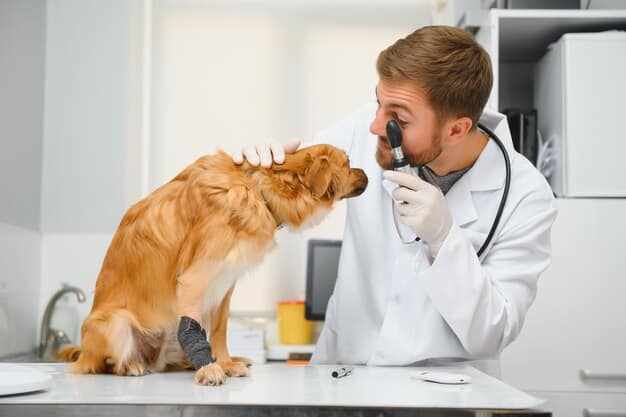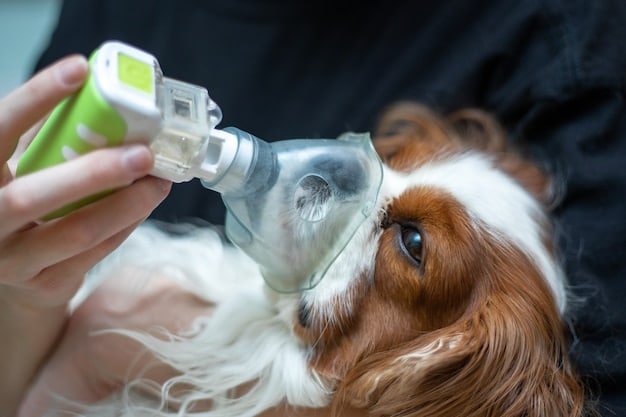Is Your Pet Coughing? Causes, Treatment & Prevention of Kennel Cough

Kennel cough, a highly contagious respiratory infection in dogs, is characterized by a persistent, hacking cough; understanding causes such as bacteria and viruses, recognizing symptoms, and implementing appropriate treatments are key to managing and preventing its spread.
Is your furry friend making unusual noises lately? A persistent cough in your dog can be alarming. Is Your Pet Coughing? Understanding the Causes and Treatments for Kennel Cough is essential for every pet owner to ensure their beloved companions stay healthy and happy.
Understanding Kennel Cough: An Overview
Kennel cough, also known as canine infectious tracheobronchitis, is a common respiratory infection that affects dogs. Understanding the basics of this condition is crucial for responsible pet ownership. It’s not just about recognizing the symptoms but also knowing how to prevent and treat it effectively.
This highly contagious disease can be contracted in places where dogs congregate, such as kennels, dog parks, and grooming salons. The infection inflames the trachea and bronchi, leading to that distinctive cough.

What Causes Kennel Cough?
Multiple pathogens can cause kennel cough, making it a complex condition. Here are some of the primary culprits:
- Bordetella bronchiseptica: This is the most common bacterial cause, often leading to severe coughing fits.
- Canine adenovirus type 2: A viral agent that contributes to respiratory infections in dogs.
- Canine parainfluenza virus: Another viral cause that can spread rapidly among dogs.
- Canine distemper virus: Though less common due to vaccination, it can still be a factor in unvaccinated dogs.
These pathogens can spread through airborne droplets when dogs cough, sneeze, or bark. Direct contact with contaminated surfaces can also lead to infection.
In conclusion, kennel cough is a multi-faceted respiratory issue caused by various bacteria and viruses. Understanding these causes helps in implementing preventive measures and appropriate treatment strategies.
Recognizing the Symptoms of Kennel Cough
Identifying the symptoms of kennel cough is the first step in ensuring your dog receives timely treatment. The symptoms can vary in severity, depending on the specific pathogen and the dog’s overall health. Being vigilant about these signs can make a significant difference in your pet’s recovery.
Here are some of the key indicators of kennel cough:
Common Symptoms to Watch For
- Persistent Cough: A dry, hacking cough is the hallmark of kennel cough. It often sounds like the dog is trying to dislodge something from its throat.
- Nasal Discharge: Clear or slightly purulent nasal discharge can accompany the cough.
- Lethargy: Affected dogs may show signs of tiredness and reduced activity levels.
- Fever: In some cases, a mild fever may be present, indicating the body’s fight against infection.
These symptoms can sometimes be mistaken for other respiratory conditions, so it’s essential to consult a veterinarian for an accurate diagnosis.
When to Seek Veterinary Care
While kennel cough is often mild and self-limiting, certain scenarios warrant immediate veterinary attention:
- Difficulty Breathing: If your dog is struggling to breathe or showing signs of respiratory distress, seek emergency care.
- Loss of Appetite: A significant decrease in appetite can indicate a more severe infection.
- Severe Lethargy: If your dog is unusually weak or unresponsive, it’s crucial to consult a vet.
- Worsening Cough: If the cough intensifies or is accompanied by additional symptoms, professional help is necessary.
In summary, recognizing the symptoms early and knowing when to seek veterinary care can significantly improve your dog’s prognosis. Timely intervention prevents complications and ensures a smoother recovery.
Diagnosing Kennel Cough: What to Expect at the Vet
When you suspect your dog has kennel cough, a visit to the veterinarian is crucial for an accurate diagnosis and appropriate treatment plan. Knowing what to expect during the diagnostic process can help ease your concerns and ensure you’re prepared to provide the best care for your pet.
Here’s a breakdown of what typically happens during a veterinary visit for kennel cough:
The Veterinary Examination Process
During the examination, the vet will likely:
- Review Your Dog’s History: The vet will ask about your dog’s recent activities, exposure to other dogs, and vaccination status.
- Perform a Physical Exam: This includes listening to your dog’s lungs with a stethoscope and checking for signs of respiratory distress.
- Assess Symptoms: The vet will evaluate the severity and nature of the cough and any other symptoms present.
These steps help the vet gather essential information to differentiate kennel cough from other potential respiratory issues.
Diagnostic Tests for Confirmation
In some cases, additional tests may be necessary to confirm the diagnosis:
- Bacterial Culture: A swab can be taken from your dog’s throat to identify the specific bacteria causing the infection.
- Viral Testing: Tests can be performed to detect the presence of specific viruses.
- Radiography (X-rays): Chest X-rays may be recommended if the vet suspects pneumonia or other complications.
By conducting these tests, the vet can pinpoint the exact cause of the cough and tailor the treatment accordingly.
In conclusion, diagnosing kennel cough involves a thorough examination and, in some cases, specific diagnostic tests. This process ensures accurate identification of the pathogens involved, leading to more effective treatment strategies.

Treatment Options for Kennel Cough
Once kennel cough is diagnosed, various treatment options are available to alleviate symptoms and help your dog recover. The specific approach depends on the severity of the infection and the dog’s overall health. A combination of supportive care and medication may be recommended by your vet.
Here’s an overview of common treatment strategies:
Medications and Supportive Care
Treatment often includes:
- Cough Suppressants: These medications help to reduce the severity and frequency of coughing.
- Antibiotics: If a bacterial infection is present, antibiotics can help eliminate the bacteria.
- Bronchodilators: These medications can open up the airways, making it easier for your dog to breathe.
- Rest: Providing a quiet and comfortable environment allows your dog to conserve energy and recover.
These measures support the body’s natural healing processes and alleviate discomfort.
Home Remedies and Comfort Measures
In addition to veterinary treatment, several home remedies can provide relief:
- Humidifier: Using a humidifier can help to moisten the airways and soothe the cough.
- Honey: A small amount of honey can help to coat and soothe the throat (consult your vet for appropriate dosage).
- Avoid Irritants: Keep your dog away from smoke, dust, and other irritants that can worsen the cough.
These home remedies complement veterinary treatment and promote faster recovery.
In summary, treating kennel cough involves a combination of medication, supportive care, and home remedies. Working closely with your veterinarian ensures your dog receives the most appropriate and effective treatment, leading to a quicker and more comfortable recovery.
Preventing Kennel Cough: Vaccination and Best Practices
Prevention is always better than cure, and this holds true for kennel cough. Vaccinating your dog and implementing best practices can significantly reduce the risk of infection. Understanding these preventive measures is essential for any responsible pet owner.
Here’s a guide to effective prevention strategies:
The Importance of Vaccination
Vaccination is a cornerstone of kennel cough prevention:
- Bordetella Vaccine: This vaccine is designed to protect against Bordetella bronchiseptica, a common cause of kennel cough.
- Combination Vaccines: Some vaccines protect against multiple pathogens, including canine adenovirus and parainfluenza virus.
Consult your vet to determine the most appropriate vaccination schedule for your dog.
Best Practices for Minimizing Risk
In addition to vaccination, consider these best practices:
- Avoid Crowded Environments: Limit exposure to crowded dog parks, kennels, and grooming salons, especially if there’s an outbreak.
- Maintain Good Hygiene: Regularly clean and disinfect your dog’s toys, bowls, and bedding.
- Strengthen the Immune System: Provide a balanced diet, regular exercise, and adequate rest to boost your dog’s immunity.
By following these practices, you can create a healthier environment for your dog and minimize the risk of kennel cough.
To conclude, preventing kennel cough involves vaccination and adherence to best practices. These measures significantly reduce the chances of infection and contribute to your dog’s overall well-being.
Caring for a Dog with Kennel Cough: What to Do at Home
Caring for a dog with kennel cough involves creating a comfortable and supportive environment at home. While veterinary treatment is essential, there are numerous steps you can take to help your pet recover more quickly and comfortably. Understanding these at-home care strategies can make a significant difference in your dog’s well-being.
Here are practical tips for caring for a dog with kennel cough:
Creating a Comforting Environment
To ensure your dog’s comfort:
- Provide a Quiet Space: Designate a quiet, draft-free area where your dog can rest undisturbed.
- Maintain Humidity: Use a humidifier to keep the air moist, which can help soothe irritated airways.
- Ensure Proper Hydration: Encourage your dog to drink plenty of water to stay hydrated.
These steps minimize stress and promote healing.
Managing Symptoms at Home
To alleviate symptoms:
- Administer Medications: Follow your vet’s instructions carefully when giving medications.
- Offer Honey: A small dose of honey can soothe the throat and reduce coughing (consult your vet for dosage).
- Avoid Irritants: Keep your dog away from smoke, perfumes, and other irritants that can worsen the cough.
These measures can significantly reduce discomfort and promote recovery.
In conclusion, caring for a dog with kennel cough at home involves creating a comfortable environment and managing symptoms effectively. By following these guidelines, you can support your dog’s recovery and ensure their well-being throughout the illness.
| Key Point | Brief Description |
|---|---|
| 🤒 Symptoms | Persistent cough, nasal discharge, and lethargy. |
| 🩺 Diagnosis | Veterinary exam and potential diagnostic tests. |
| 💊 Treatment | Cough suppressants, antibiotics, and rest. |
| 🛡️ Prevention | Vaccination, hygiene, and immune support. |
Frequently Asked Questions
▼
Kennel cough is a highly contagious respiratory infection in dogs, characterized by a harsh, hacking cough. It’s often contracted in places where dogs congregate, like kennels or dog parks.
▼
Kennel cough spreads through airborne droplets produced when an infected dog coughs or sneezes. It can also spread through direct contact with contaminated surfaces.
▼
In most cases, kennel cough is mild and self-limiting. However, it can be more serious in puppies, elderly dogs, or those with compromised immune systems. Consult your vet.
▼
Kennel cough is species-specific and cannot be transmitted to humans. However, it’s essential to maintain good hygiene when caring for a sick dog to prevent other potential infections.
▼
Vaccination is the most effective way to prevent kennel cough. Additionally, avoid crowded environments and maintain good hygiene to minimize the risk of infection.
Conclusion
Understanding kennel cough, from its causes and symptoms to its treatment and prevention, is crucial for every dog owner. By being informed and proactive, you can ensure your furry friend stays healthy and enjoys a better quality of life. Remember to consult your veterinarian for personalized advice and care.





